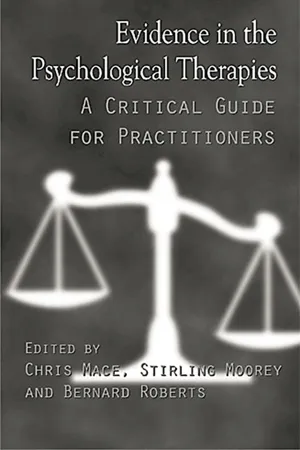Psychology
Psychological Evidence
Psychological evidence refers to the empirical data and findings derived from psychological research and studies. It encompasses a wide range of evidence, including behavioral observations, cognitive assessments, and neuroscientific data, which contribute to our understanding of human behavior, emotions, cognition, and mental processes. This evidence is crucial for developing theories, informing interventions, and advancing the field of psychology.
Written by Perlego with AI-assistance
Related key terms
1 of 5
3 Key excerpts on "Psychological Evidence"
- eBook - PDF
Evidence and Proof in Scotland
Context and Critique
- Donald Nicolson(Author)
- 2019(Publication Date)
- Edinburgh University Press(Publisher)
CHAPTER SIX The Psychological Context I: Witnesses and Truth 1 Introduction Having looked indirectly at documents and real evidence while exploring the scientific context of evidence and proof, we now turn to the other main form of evidence, namely the testimony of observational witnesses. As the first of two chapters devoted to the psychological context of evidence and proof, this chapter describes the two broad psychological processes rele-vant to witnessing, namely those involved in observing, remembering and recalling relevant facts, and those involved in evaluating the accuracy and honesty of these witnesses. Chapter Seven then explores the psychological processes involved in investigating, analysing, presenting and evaluating the facts relevant to a case as a whole, as opposed to individual items of evidence in the form of testimony, documents and real evidence. The fact that two chapters are devoted to psychology shows that it is central to the processes of evidence and proof 1 – almost by definition, as suggested by Bentham’s already quoted 2 definition of evidence as ‘any matter of fact, the effect, the tendency or design of which, when presented to the mind , is to produce a persuasion either affirmative or disaffirmative concerning the existence of some other matter of fact’. 3 Simply put, investigating and evaluating facts are impossible without psychological processes and hence these are central to our understanding of evidence and proof. - eBook - ePub
Evidence in the Psychological Therapies
A Critical Guidance for Practitioners
- Chris Mace, Stirling Moorey, Bernard Roberts, Chris Mace, Stirling Moorey, Bernard Roberts(Authors)
- 2005(Publication Date)
- Routledge(Publisher)
Chapter 5 Evidence, influence or evaluation? Fact and value in clinical science Paul Sturdee This chapter aims to stimulate debate about the evidential status of scientific research outcomes in mental health. The intention is not to undermine science, but rather to claim that the credibility of science rests on the transparency with which evidential claims are argued. I will argue that scientific research in psychological fields cannot be viewed as providing objective knowledge about phenomena which are themselves unproblematic, and that we should instead view the outcomes of research as being themselves inherently problematic and open to interpretation. The approach taken will be to examine what concept of evidence is appropriate to psychiatry; understanding this will have implications for the closely related fields of clinical psychology and psychotherapy. I will argue that scientific evidence cannot provide proof, it can only affirm our commitment to the conceptual structures and theoretical constructs provided by the paradigm within which what counts as evidence has already been defined. The proponents of scientific psychiatry, especially those who champion evidence-based medicine (EBM) trade, implicitly, on the realisability of an ideal of science as the impartial, disinterested seeking after truth resulting in objective knowledge—although, as I shall try to demonstrate, this realisability is illusory. Science is an inherently social activity with its own ends and means, and those ends and means are circumscribed by the interests and concerns of those who control the signification and dissemination of information and knowledge - No longer available |Learn more
Life as a clinical psychologist
What is it really like?
- Paul Jenkins(Author)
- 2020(Publication Date)
- Critical Publishing(Publisher)
The study revealed mixed views among the participants. The guidelines were seen as a ‘ useful guide to the evidence base ’ (Court et al, 2017, p 902) and as a tool which could be used to promote consistency and as a means of improving access for those experiencing mental health problems. However, the guidelines were also seen as creating ‘ an illusion of neatness ’ (p 902) not matching everyday 69 Research in Clinical Psychology 69 The idea that these two things can be integrated does not come easily to many (see also Blaine, nd) but neither individual clinical expertise nor the best available external evi-dence is enough on their own (Sackett et al, 1996 ). A move to balance clinical expertise and ‘best’ evidence was heralded in the early days of defining evidence-based practice (Evidence-Based Medicine Working Group, 1992 ; Sackett et al, 1996 ) but an evidence- based stance has sometimes been mistaken to mean a ‘cookbook’ approach to clinical care. Within Clinical Psychology, there has been widespread doubt about the relevance of evidence-based practice, and therefore some resistance to its adoption (Lilienfeld et al, 2013b ). However, such resistance ‘ may inadvertently fuel the continued popularity of unscientific or even pseudoscientific interventions ’ (Lilienfeld et al, 2013b , p 884) thus harming both patients and the profession of Clinical Psychology. It is therefore important to consider the role of scientific understanding within Clinical Psychology, and the role that clinical psychologists play in the move towards effective, evidence-based healthcare. WHY IS SCIENTIFIC RESEARCH UNDERUSED IN CLINICAL PSYCHOLOGY? A full review is outside the scope of this chapter, but it is important to touch on the issues around scientific practice in Clinical Psychology given that this is not only debated at policy level but is also likely to inform your own view of treatment and day-to-day practice.
Index pages curate the most relevant extracts from our library of academic textbooks. They’ve been created using an in-house natural language model (NLM), each adding context and meaning to key research topics.


